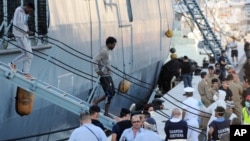Ships from Norway and Denmark have picked up nearly 1,000 migrants from small boats off the coast of Libya in the past 24 hours.
Svein Kvalavaag, the captain of the Norwegian Siem Pilot vessel, said on Monday he picked up 671 people from two wooden boats north of the Libyan capital, Tripoli.
Late Monday night, the ship was asked to take 99 more migrants that had been rescued by a Russian tanker.
Women, children
Kvalavaag told a Norwegian maritime industry site that the 770 refugees included 140 women, of whom three were pregnant, and 45 children. They were all brought to the southern Italian island of Sicily.
The Norwegian supply vessel recently had joined the European Union's border protection agency, Frontex, the Norwegian news agency NTB said.
Jesper Jensen, a spokesman for the Denmark-based Torm company, said its Singapore-flagged oil tanker Torm Arawa on Monday responded to a call from the Italian coast guard after two boats carrying migrants were reported in distress off the coast off Libya.
Jensen said Tuesday it picked up 222 refugees, gave them food, water and blankets, and brought them to a port in Italy's southern region of Calabria.
Jensen said he was pleased the crew had saved so many lives.
In the past months, thousands of migrants have been crossing the Mediterranean to reach Italy and Greece. About 2,000 are missing and feared dead.
Government warning
Meanwhile, forces from Libya's internationally recognized government warned European countries that any vessels entering Libyan waters without permission would be targeted by airstrikes.
"Any vessel found in Libyan waters without previous cooperation or permission will be targeted by the air force," Libyan air force commander Saqr Al-Jaroushi told Reuters late on Monday.
The warning came after European Union foreign ministers agreed Monday to launch a naval operation to combat human traffickers who have brought thousands of migrants on perilous journeys to Europe from Libya.
The EU naval operation will be limited to intelligence-gathering for the time being because it has yet to obtain United Nations authorization for a wider scope of operations.
Securing consent from Libya, where two rival governments and their armed forces are battling in a chaotic power struggle for control, has been a major concern for European powers trying to stem the flow of migrants from Libya's shores.
Some material for this report came from Reuters.




